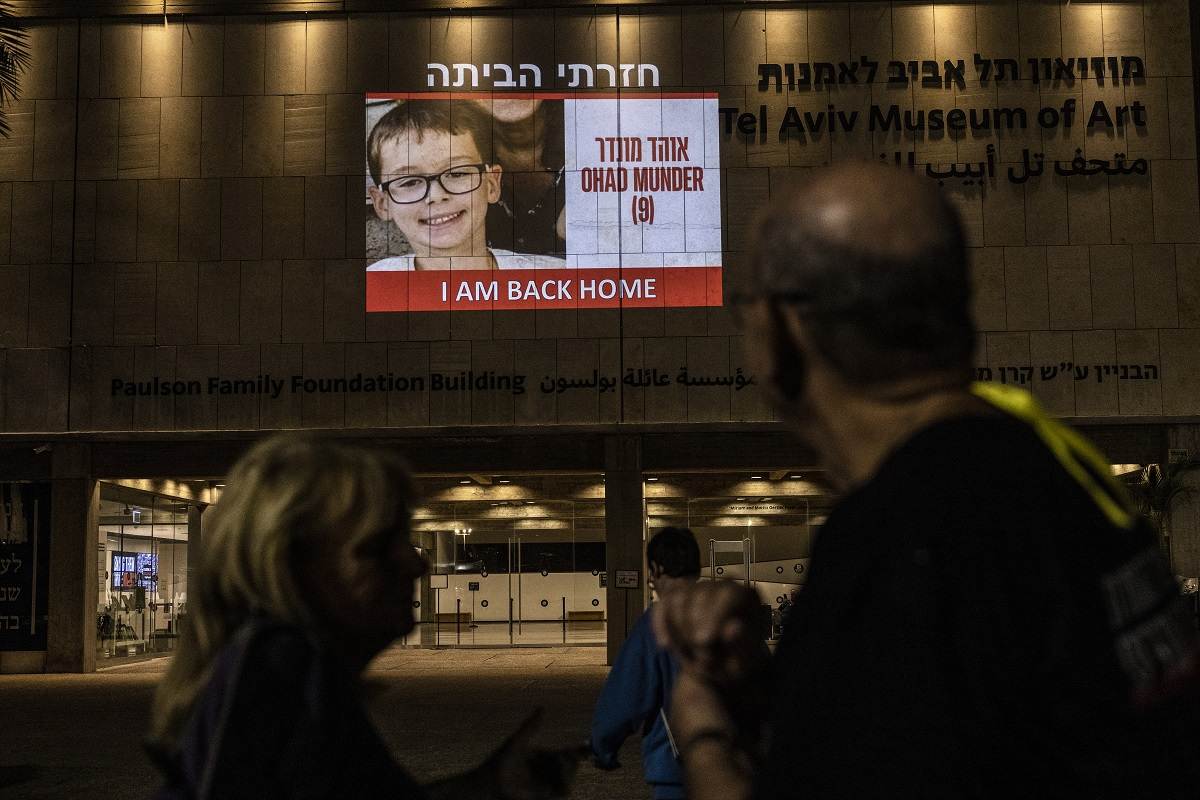
A photo of Ohad Munder, 9, is projected on the Tel Aviv Museum of Art following his release from captivity in Gaza on Friday along with his mother and grandmother.
13:51 JST, November 28, 2023
JERUSALEM – They survived on rice and bread and slept as best they could on chairs and benches. At least one man tried to escape his captors when an Israeli airstrike caused the building he was in to collapse. A young boy kept a diary of his experience.
The stories of hostages kidnapped by Hamas on Oct. 7 are emerging, slowly and in fragments, as dozens of Israeli women and children, as well as foreign workers, are released from Gaza as part of a humanitarian pause in the fighting.
Israel and Hamas agreed Monday to extend the pause for two additional days, under a deal brokered by Qatar and Egypt that will allow more hostages to be exchanged for Palestinian women and teenagers in Israel prisons. Eleven Israelis and 33 Palestinians were released later Monday.
For the families of the hostages, the silence from their loved ones over seven long weeks has been torturous. Now, as some are reunited, there are new challenges to navigate and unseen wounds to consider.
Most of the freed hostages are being treated in hospitals, far from the gaze of the media and a shellshocked country that is still searching for answers. In recent days, a handful of the former captives’ relatives have given interviews, providing a first, limited glimpse into their ordeal.
Much of the information about where, and how, the hostages were held remains elusive. Psychologists have warned of the dangers of pressing the newly released for information, citing the risk of re-traumatization.
The captives, including young children and the elderly, were ripped from their families after Hamas militants killed loved ones and neighbors – sometimes in front of them. Israel’s retaliatory military campaign has killed more than 13,000 people in Gaza, shattering entire neighborhoods and, hostages’ families fear, putting the lives of their relatives in danger.
“Some of them decided to stay longer in the hospital in order to cope with the event,” Itai Pessach, the director of Sheba Medical Center’s Safra Children’s Hospital, said Monday. “We’re also exposed to very difficult, painful, complex stories about captivity. Despite the optimistic appearance, the captivity period was difficult and complex, and it will take time for wounds to heal.”
In an online news conference Sunday, the families of several former Israeli hostages said their loved ones had yet to fully grasp the extent to which their cases had gripped their country – and the world. For now, they were staying in the loving embrace of a small circle of relatives.
Yaffa Adar, 85, counted every one of her more than 50 days in captivity and never lost hope that she would eventually be returned to Israel, her granddaughter Adva said. “I’m so proud to be her granddaughter,” she said. “It means the world to see that she is with us.”
Adar and Keren Munder, 54, returned much thinner than before, relatives said. “They were eating, but not regularly and not all of the time,” said Merav Mor Raviv, Munder’s cousin. Munder and her mother, Ruth, 78, had lost between 13 and 17 pounds, Raviv said.
They slept on rows of three chairs tied together, like benches in a waiting room, and had to knock on the door to gain their captors’ attention when they needed to use the bathroom. The wait sometimes lasted several hours, they said.
Despite all they’ve been through, most of the returning hostages appeared to be in stable physical condition. Eyal Nouri, the nephew of Adina Moshe, 72, freed Friday, said his aunt “had to adjust to the sunlight” because “she was in complete darkness” for weeks, the Times of Israel reported.
In the early days of the hostages’ captivity, relatives geolocated some of them in Gaza using their smartwatches or iPhones. Their whereabouts after that were shrouded in mystery, though Hamas had said hostages were being kept in the group’s vast tunnel network that runs underneath the strip.
In an interview with Israel’s Channel 12, Raviv said her family members had been kept above and below ground – sometimes they were guarded by armed militants, she said, other times it was less clear. “They do not know where they were; people watched over them.” There were Hebrew speakers among them, she said.
Munder’s 9-year-old son, Ohad, spent his birthday in captivity. After a gentle and joyous reunion with his friends, one of them told Israel’s Walla News that the boy had kept a diary while he was held but left it in Gaza. His mother feared that its existence might endanger him.
The family testimonies suggest that the hostages were isolated, cut off from the outside world. Some did not know the fate of the loved ones they were taken from.
In an interview with Kan public radio, Elena Magid, the aunt of Israeli Russian hostage Roni Krivoi, who was released Sunday, said the 25-year-old had at one point managed to escape his captors amid an airstrike and heavy fighting.
“He was able to flee after the building collapsed, and for a few days he hid, alone,” she said. “In the end, the Gazans found him and brought him to the terrorists.”
It is unclear how many of the hostages are still alive. Hamas militants have said that some have been killed in Israeli airstrikes, but they have not produced evidence to corroborate their claims.
One hostage, a young woman, was seen Saturday night on crutches in a video released by Hamas documenting the handover. She grimaced as she entered a Red Cross vehicle. On Monday, television footage showed 11-year-old Yuval Engel leaving Gaza in a wheelchair.
At a news conference Monday, the family of Elma Avraham, who was released Sunday, said the 84-year-old required immediate medical attention. “My mother suffered from severe medical neglect. Lifesaving medication was not given to her,” said Avraham’s daughter, Tali, at the Soroka University Medical Center, in southern Israel.
She criticized the Israeli government, as well as the International Committee of the Red Cross, which received the hostages from Hamas: “It appears that she has been abandoned twice; once on October 7, and again by all the organizations that were supposed to help her.”
The hospital’s deputy administrator, Tzachi Slotsky, said Avraham had a preexisting medical condition when she was kidnapped. “She is still suffering from a difficult health condition,” he said.
While nearly 70 hostages have now been released, more than 150 are still believed to be in captivity. The families that have been made whole say they will not rest until the others come home.
“The fight is not over, and we need each and every one of you to continue, help us, share their stories and demand their return because each one of them has a family who needs to be reunited with their loved ones,” Adva Adar said.
Top Articles in News Services
-

Survey Shows False Election Info Perceived as True
-

Hong Kong Ex-Publisher Jimmy Lai’s Sentence Raises International Outcry as China Defends It
-

Japan’s Nikkei Stock Average Touches 58,000 as Yen, Jgbs Rally on Election Fallout (UPDATE 1)
-

Japan’s Nikkei Stock Average Falls as US-Iran Tensions Unsettle Investors (UPDATE 1)
-

Trump Names Former Federal Reserve Governor Warsh as the Next Fed Chair, Replacing Powell
JN ACCESS RANKING
-

Producer Behind Pop Group XG Arrested for Cocaine Possession
-

Japan PM Takaichi’s Cabinet Resigns en Masse
-

Man Infected with Measles Reportedly Dined at Restaurant in Tokyo Station
-

Israeli Ambassador to Japan Speaks about Japan’s Role in the Reconstruction of Gaza
-

Videos Plagiarized, Reposted with False Subtitles Claiming ‘Ryukyu Belongs to China’; Anti-China False Information Also Posted in Japan

























